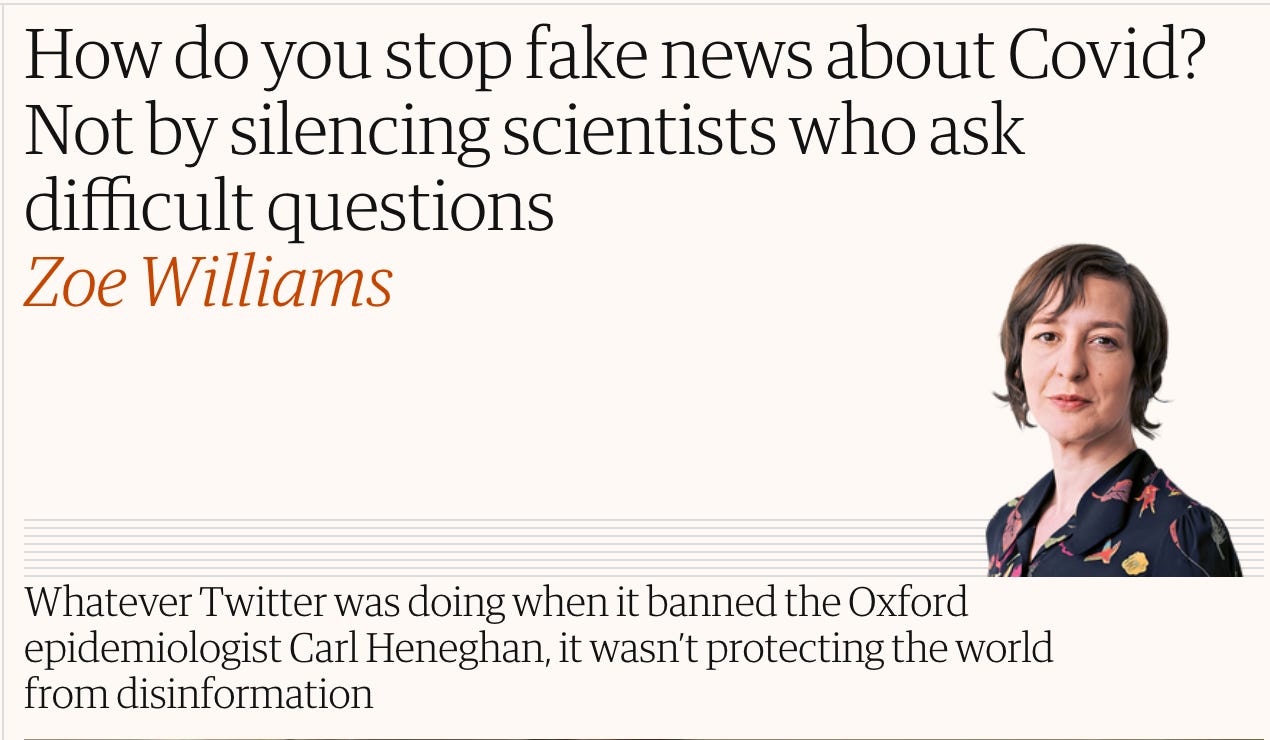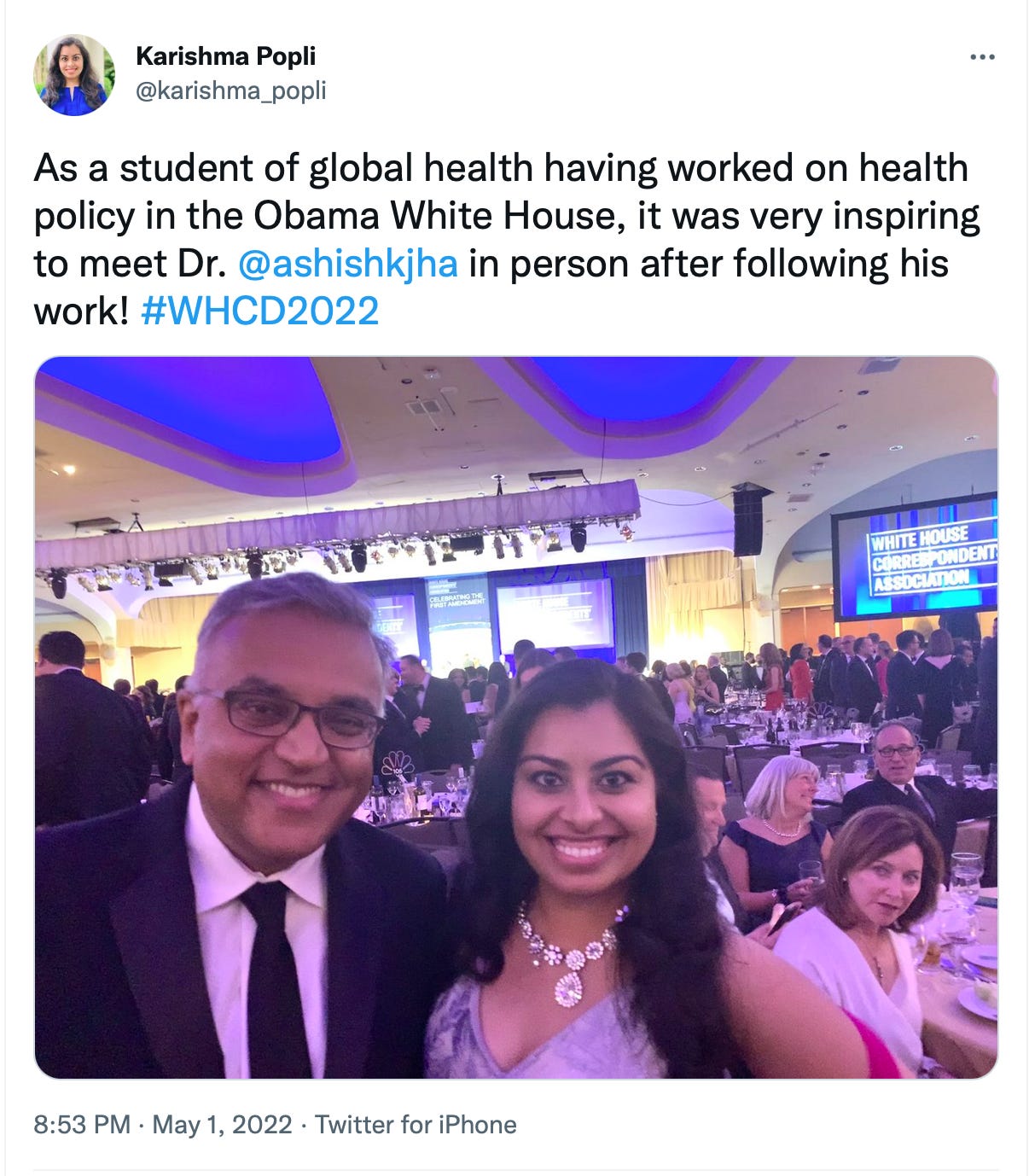Wokes Gone Wild: Association of Health Care Journalists Ignore CDC, Go All in on Masks
At this week's conference, AHCJ reporters might be the only group walking around Austin wearing N95 respirators. "They're gonna look like Martians."
6 minute read
UPDATE: Since this article posted, a reader sent a photo of the White House Coronavirus Response Coordinator attending a journalism dinner without a mask, emphasizing the overreaction of the AHCJ mask mandate.
The Association of Health Care Journalists will kick off their annual conference in Austin, Texas, on Thursday—a four-day event filled with training programs, panels with popular speakers, and field trips to local sites where reporters can learn about the latest innovations in research and clinical care. And, of course, tacos.
“At the end of the day, our work informs readers and helps hold policymakers, health researchers, doctors and others in the health care system accountable for what they do and do not do,” reads a letter from several Texas reporters announcing the event, including Tara Haelle, AHCJ’s lead expert for teaching reporters about medical studies.
For the AHCJ, however, informing readers and holding experts accountable apparently requires ignoring local and federal guidelines on masking, as well as the scientific controversy on mask effectiveness. They’re going all in on masks: “Masking will be required in all meeting rooms, corridors and other spaces where social distancing may be difficult, as well as on field trips buses and indoors on those trips,” reads the AHCJ conference announcement.
“This is just sheer irony,” said a professor who is a frequent attender and sometime speaker at AHCJ conferences, but who did not wish to be named. “Here’s a group dedicated to journalism that bought a certain narrative and they’re running with it. That’s not journalism; that’s wokeness gone wild.”
Last month, Austin’s mayor signed an order terminating the city’s mask requirement, as the Centers for Disease Control and Prevention (CDC) found the community has a low level of risk. “Whereas the current high levels of immunity provided by 72% of the population being fully vaccinated and a large portion of the population that has natural immunity there is less risk of people in our community requiring hospitalization or dying from Covid-19.”
When the conference begins Thursday morning, a group of AHCJ reporter attendees will visit the University of Texas’s Dell Medical School to learn about computational medicine and cutting-edge brain research. There, they will stand out not only as non-scientists, but also as the only ones likely masked.
“As a school within The University of Texas at Austin, we follow the university’s policies,” explained Dr. Amy Young, vice dean of professional practice at the Dell Medical School. “We are no longer recommending masking indoors except in health care delivery units. In these environments, our providers and learners may come into contact with patients that are at high risk for disease.”
“I just wonder if the AHCJ conference is doing a deep dive on anything as they’re obviously ignoring the scientific controversies on masks and vaccines,” added the professor who did not wish to be named. “They’ll likely be the only people walking around as a group wearing masks in Austin. They’re gonna look like Martians.”
I contacted the AHCJ’s Tara Haelle on Twitter and several times by email for comment, and she sent my questions to the AHCJ’s president who did not respond. Since the pandemic’s beginning, Haelle has faced an onslaught of criticism for giddy, ungainly takes on COVID medical research. In one example, Haelle wrote an essay for Forbes titled, “No, You DO NOT Need Face Masks for Coronavirus—They Might Increase Your Infection Risk.” Haelle later reverted her thinking and changed the title to “Masks Prevent you From Infecting Others With Coronavirus, But May Not Protect You From Being Infected.”
In an awkward moment of irony, Haelle will be speaking on a Saturday morning panel to address “Can journalists really do anything about misinformation and disinformation?”
Mask efficacy doubts
The current custom in journalism holds that whatever the National Institutes of Health’s Anthony Fauci calls misinformation is, by fiat, medical misinformation. Until Fauci changes his mind, that is.
Early in the pandemic, Fauci argued that masks provide “some slight benefit” and recommended against wearing masks, however, he became much more aggressively pro-mask, after he made disagreeing with everything-Trump part of his medical agenda. Since Fauci became a clear Trump opponent, reporters have dutifully lined up to support him, a process that influences rather than informs public health debates.
Numerous experts continue to question mask efficacy, despite many science writers turning COVID-19 virtue signaling into a Twitter art form. “We established the need for evidence-based medicine forty years ago,” said Dr. Carl Heneghan, an epidemiologist and professor of evidence-based medicine at Oxford University. Heneghan pointed me to the Cochrane Review of masks that found no evidence that masks reduce respiratory viral infections.
He added that the pandemic created an environment in which these results were ignored, even as low-quality studies were elevated if they found results that showed masks worked. For example, The Lancet published a June 2020 paper that concluded masks caused a huge reduction in infection risk. Around this same time, an ad hoc group of researchers published a preprint that found a similar 80% reduction of infections with masks, leading to coverage in multiple media outlets.
“It sounds too good to be true,” reported Vanity Fair, announcing masks would cause COVID-19 infections to plunge. “But a compelling new study and computer model provide fresh evidence for a simple solution to help us emerge from this nightmarish lockdown.”
Heneghan said Vanity Fair got it right in the first sentence: It sounds too good to be true.
“If masks really caused such reduction in infections, then there’s no need for vaccines,” he said. “Most medical interventions only offer a small benefit. You have people in the media setting an editorial opinion, and they tend to amplify extreme views.”
In late 2020, Heneghan and a co-author highlighted a study that found masks do not significantly reduce rates of infection and met immediate criticism from a Guardian columnist—who has no training or experience in research—for being agents of disinformation.
Just last month, a different Guardian columnist wrote that you cannot shut down fake news by silencing scientists who ask difficult questions like Carl Heneghan. Without a hint of irony, the columnist noted, “[T]here is a fault in the conception of disinformation and how to prevent its spread.”
CDC “evidence”
Much of the “evidence” for masking comes from studies published by the CDC, but a quick check of their references finds they come to these conclusions by nimbly avoiding citation of the Cochrane results. Last December, The Atlantic published an investigation that ripped apart a study published by the CDC that found a dramatic more-than-tripling of risk for unmasked students.
While CDC Director Rochelle Walensky waived this study around on Twitter and during television interviews, the CDC then recommended that all kids 2 and older should be masked in school.
Masking policy in schools came to a head in Berkeley, California, when Berkeley professor Benjamin Recht co-published an essay in Newsweek filleting the purported evidence that children should be masked, a problem he investigated to protect his own children attending the city’s schools.
If N95s filter so well, why are respirators an ineffective intervention? Because masking is a behavioral intervention as much as a physical one. For respirators to work, they must be well fitting, must be tested by OSHA, and must be used for only short time windows as their effectiveness diminishes as they get wet from breathing.
Newsweek later updated Recht’s essay to note that, after he had published it, Berkeley’s schools reversed their policy and made N95s optional for children.
“Most of the people promoting masks were charlatans,” Recht told me in an interview, adding that masks most affect kids and people in the service industry, which offends him and his liberal politics: “The people telling you masks work—people working at Twitter and Youtube—I know and have worked with those people. They’re the same ones telling you about self-driving cars and how doctors are going to be replaced. These are not reliable sources.”
Recht studies artificial intelligence to understand how learning occurs, but remains confused by how reporters gather information and choose expert voices. “You have these bubbles and certain questions just aren’t allowed to be asked,” he said. “It’s weird how disinformation is a word that doesn’t mean anything anymore.”
UPDATE: During the AHCJ conference, White House Coronavirus Response Coordinator Dr. Ashish K. Jha attended the White House Correspondents’ Dinner, where nobody seems to be wearing a mask. What is going on with the AHCJ’s overreaction?
CORRECTION: A reader wrote in to correct that the AHCJ stands for “Association of Health Care Journalists.” Thanks for helping!












“Most of the people promoting masks were charlatans,” Recht told me...
Too kind!
Brilliant, as usual. Keep up the good work Paul, who I know, ain't no Martian!